Spring 2022 Newsletter
Contents
- Message from the Chair
- Department Graduates
- New Faculty and Staff
- Gerry Prody's Retirement
- Student Awards, Fellowships, and Scholarships
- Student Research Highlights
- WWU Chem Club
- ACS NORM
- Interdisciplinary Science Building
- Faculty Promotions and New Roles
- Faculty Awards and Honors
- Grant Funding
- Publications
Department Donors
We wish to extend a special thank-you to alumni and friends of the department who donated to Chemistry Department Western Foundation funds this year! Our Foundation funds support a variety of activities including student scholarships and academic awards, undergraduate summer research stipends, student travel to conferences, department seminars, equipment purchase and repair, and events for department majors and alumni. We appreciate your support! If you would like to make a gift, please visit foundation.wwu.edu or call (360) 650-3027.
Message from the Chair

The Wobble Hypothesis
Greetings from the other side of quarantine! Over the past year, our Western community has gone through more transitions, troubleshooting, and reflection than any year in recent memory. Starting in the fall of 2021, we cautiously entered back into in-person teaching for most of our classes after 18 months of being almost entirely remote. Western’s trajectory through the fall and winter quarter surges of Covid19 demonstrated that the broad compliance of our community with mask wearing and vaccinations resulted in fewer positive cases on campus than most other universities around the country. We’re still cautious in our activities, understanding that the pandemic isn’t quite over, but has transitioned to a new phase to which we’re continually adjusting.
In this year’s newsletter, you’ll read about some of our own changes that have occurred in the Chemistry Department over the past year. First, we say thanks and farewell to our former staff members Alexi Guddal, Miranda Abrashi, and Amanda Weis. They were all given opportunities to work in positions closely related to their graduate degrees, which is exciting for their career progressions. Prof. Spencer Berger also left our department to start a tenure-track position at Bellingham Technical College. Spencer’s leadership with our graduate teaching assistants will be missed, however, Prof. Amy Cully has elected to transition to the faculty and take over Spencer’s position coordinating our teaching assistants. We are excited to welcome several new members to our staff and faculty. Meghan Blodgett-Carrillo joined the staff as our new general chemistry lab coordinator, Jessica Coogan joined the department office as our new program coordinator, and Mark Lorenz joined as our new instrumentation technologist. Our faculty have several new additions as well, with Profs. Samir Abdelrhman, Michael Enright, Aaron Miller, and Britt Tyler joining throughout the 21-22 academic year. Aaron and Britt have been focused on teaching general chemistry, Samir has focused on teaching general chemistry, analytical chemistry, and instrumental analysis, and Michael has started his tenure-track position building his research program focused on nanomaterial systems for sustainable energy solutions while teaching in the analytical chemistry subdiscipline. We’re excited for the new voices in our community and look forward to collaborating with them on fostering our students’ successes. Another change that is afoot in our Chemistry community is the opening of a new building, the Interdisciplinary Science Building, or ISB. The ISB will house our entire general chemistry laboratory program as well as our biochemistry lab curriculum. Additional spaces in this building will be for lab-based and student-centered instruction for programs in Biology, the Marine and Coastal Sciences program, and the College of the Environment. It will be a tall task to get our operations moved into the new building this summer to start our operations at the beginning of fall quarter 2022!
I continue to be in awe as I reflect on the perennial activities, successes, and accomplishments of our students. This year, we have a graduating class of 88 students, again one of the largest we have had as a department. Our department’s research programs continue to grow in both size and vibrance. In the past academic year, the Chemistry faculty have published 26 peer-reviewed articles, which include 34 undergraduate and 23 graduate student co-authors. Our faculty continue to be successful in acquiring funding for their research programs through external sources such as the National Science Foundation, the National Institutes of Health, and the Research Corporation for Science Advancement. They have also received various awards demonstrating their commitment to leveraging their research interests with their student mentorship activities. Prof. Amanda Murphy was named a 2021 Henry Dreyfus Teacher-Scholar, Prof. Mike Larsen received a 2022 Cottrell Scholar Award, and Prof. John Gilbertson was honored with the 2022 Arlan Norman Award for Excellence in Student Mentoring. Our department organized the 2021 Northwest Regional ACS Conference that was held remotely during the spring quarter of last year. It was great to see our students representing the cutting-edge science being done in WWU Chemistry alongside scholars and students from other regional institutions. A special thanks to Profs. Steven Emory, John Gilbertson, Greg O’Neil, and Jim Vyvyan for working to organize this expansive meeting.
As members of our community, you have supported our students on their paths to realize their goals and achieve successes through your generous gifts, and for those we are truly grateful. This year, WWU Give Day is on May 26th. All our designated funds you can find on our Give Day page are used to directly impact students in their growth as learners and scholars.
I would like to conclude my remarks for the 2021-22 academic year by celebrating the career of Prof. Gerry Prody. Gerry has been on the faculty for 38 years and is retiring at the end of Spring quarter. When I reflect on the state of Biochemistry in 1984 as compared to present day, I am certainly humbled to think how complex it must have been to keep our curriculum at pace with a rapidly advancing field. Gerry was the first person I met as a representative of WWU when she called me to invite me for an interview in 2006. The first thing Gerry said to me was, “I like your name, Paul. That’s my dad’s name!” To which, I immediately replied, “Actually I go by Clint … (awkward pause) … My dad’s name is also Paul.” From there, it was clear that our fondness for our fathers and love of biochemistry gave us a kinship as we co-instructed the biochemistry laboratory class together for the first 13 years of my career. I have her to thank for encouraging me to be inventive with our curriculum, which we completely overhauled after my first year on the job to incorporate a discovery-driven project characterizing bacterial translation factors. This resulted in my first publication as an independent faculty member (co-authored with Gerry and our students, Scott Delbecq, Peter Littlefield, and Justin Walter), an education publication on the lab we devised. Gerry’s influence over our curriculum, high expectations of her students, and mentorship of younger faculty members leave as a legacy a top-tier Biochemistry program that produces some of the best trained young scientists of this generation. It is always a joy to hear from them as they progress through their careers and achieve myriad accomplishments. Gerry’s trademark flair and unique insight will be missed, but I’m confident we will continue to build on the solid foundation Gerry has been instrumental in paving.

Department Graduates
Congratulations to all 88 of our graduates from Spring 2021 to Winter 2022!
B.S. Chemistry
- Sam Baldwin
- Henry Benasutti
- Meredith Boxx
- Olivia Duco
- Savannah Froggatt
- Jessica Gallawa
- Ryan Hagmann
- Jacob Heins
- Alexandra Hoff
- Hanalei Lewine
- Joseph Loughren
- Alexander Luchi
- Boomer Lusink
- Reilly Lynch
- Sean McBurney
- Chase Nielson
- Kayla Owens
- Sage Pavey
- Jonah Pawley
- Aliandra Pierce
- Amy Pollock
- Cody Schwans
- Jason Stockwell
- Jordan Vaughan
- Annalyssa Vesely
B.A. Chemistry
- Benjamin Baker
- Skylar Brown
- Tiffany Chamberlain
- Casey Cox
- William Craig
- Jacob Higbee
- Haley Holliday
- Andrew Kreps
- Jacob Lagajeno
- Tristan Maass
- Remington Morris
- Raeanna Rosenquist
- Karli Smythe
- Dylan Sullivan
- Adam Zukowski
B.A.E. Chemistry/Education
- Jack Clemens
- Liam Galloway
- Allison Pinnock
- Jessica Trottier
B.S. Biochemistry
- Eddy Bartley
- Taylor Billett
- Mia Brinkley
- Melody Campbell
- Ka Mei Chan
- Molly Cowman
- Kelly Fick
- Melody Gao
- Sarah Haines
- Lucinda Innes
- Alexandria Jarvis
- David Johnson
- Lindsey Jones
- Avery Krouse
- Lauren Lesniak
- Jacob Olson
- Isabel Piper
- Reeth Pooni
- Estelle Ronayne
- Dina Slipock
- Allison Smit
- Justin Svendsen
- Casey Tomlin
- Colton Tucker
- Brandon Vogel
- Conner Westenhaver
- Kyle Whitham
- Alex Wrede
- Aleena Young
- William Zwolinski
M.S. Chemistry
- Haley Wofford
- Gunnar Carlson
- Pui Man Cheung
- John Crockett
- Edwin Enciso-Lopez
- Inna Fomina
- Daniel Korus
- Walker Marks
- Briana Mulligan
- Shaun Peters
- Erin Rosenkranz
- Racine Santen
- Corey Teply
- A.P. Wang
New Faculty and Staff

Samir Abdelrhman, Instructor
Samir Abdelrhman joined the Chemistry Department in the spring of 2021 as an Instructor of Chemistry. Previously, he was a postdoc at Lund University, Sweden and a visiting scholar at Virginia Tech. He received his Ph.D. in Inorganic Chemistry, and is interested in studying the synthesis and design of new materials for energy applications. Outside of work, Dr. Abdelrhman is interested in philosophy, and is an author of four books that investigate the connections between old languages and physical phenomena. He enjoys exploring nature, traveling, playing soccer, and swimming.
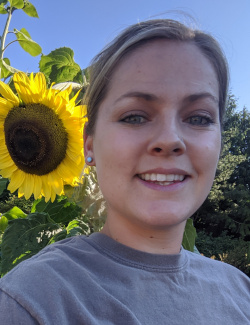
Meghan Blodgett-Carrillo, General Chemistry Laboratory Coordinator
Meghan Blodgett-Carrillo joined Western in January of 2022. She earned her B.S. in Geology from WWU in the winter of 2015. While attending Western, she was a four-year letter winner for the varsity softball team. After graduating, Ms. Blodgett-Carrillo spent six years working for a local construction materials testing firm, Materials Testing & Consulting, where she managed their corporate laboratory in Burlington, WA. She is excited to apply her experience in lab management to the field of chemistry and is delighted to return to work at her alma mater. Originally from Monterey, CA, she fell in love with Bellingham and has since put down roots. Outside of work, her hobbies include running, hiking, playing disc golf, and spending quality time with her partner Mike, their two dogs, and cat.

Jessica Coogan, Program Coordinator
Jessica Coogan joined the Chemistry Department in August of 2021. She earned her B.A. in Political Science from WWU in the winter of 2018. After graduating, Ms. Coogan spent two years working for a local woodworking tool manufacturing company while spending a lot of time traveling both domestically and internationally. In March of 2020, she joined Western in the procurement department before transitioning to Chemistry. She is excited to continue helping students in any way possible while they work to pursue their degrees. Outside of work, her hobbies include reading, thrifting, playing music, taking weekend trips around Washington, and traveling whenever possible.
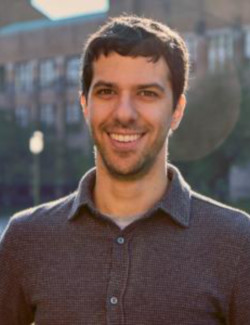
Michael Enright, Assistant Professor
Michael Enright joined WWU in the fall of 2021 as an Assistant Professor of Chemistry. Dr. Enright hails from the great state of Wisconsin and earned an A.B. in Chemistry from Ripon College. While attending Ripon, several formative research experiences, including the Knop Science Scholarship supported research program at Ripon College, CURE-REU at UMass Amherst, and GRO-U fellowship at the Environmental Protection Agency Western Ecology Division Laboratory, cultivated his interest in chemistry and renewable energy. Dr. Enright earned his Ph.D. in Chemistry at the University of Washington under the advisement of Prof. Brandi Cossairt exploring nanoparticles for solar energy conversion and biomass valorization. After graduate school, Dr. Enright joined the research lab of Prof. Ralph Nuzzo as a postdoctoral research associate where he developed quantum dots for luminescent solar concentrators and was an active collaborator in the Photonics at Thermodynamic Limits – EFRC.
Dr. Enright’s new but rapidly growing research team at WWU develops nanomaterials for sustainable solutions through solar energy conversion. One of the Enright research team’s objectives is to synthesize new nanoscale catalysts for renewable fuel generation, such as hydrogen gas, or to facilitate chemical reactions under mild conditions to make high-value chemicals and pharmaceuticals. The research group is also working to develop materials to concentrate sunlight using luminescent solar concentrators, also known as power windows. These power windows are composed of a gray-scale, tinted window that both allows light to be transmitted to illuminate a room while capturing a fraction of sunlight around the edge of the window at a solar panel to power the building with electricity. The Enright group is interested in developing both strategies to enable remote, off-grid energy sources.
Outside of the lab and classroom, Dr. Enright enjoys hiking, traveling, and running. It is not uncommon to find him in the stands supporting WWU’s soccer, volleyball, and basketball teams.
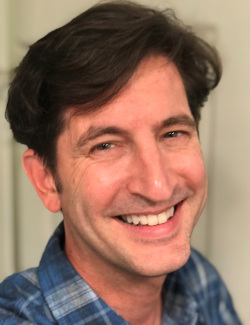
Mark Lorenz, Instrument Specialist
Mark Lorenz joined the Chemistry Department in the fall of 2021, after a 20-year career in analytical water quality analysis and laboratory management. He grew up in Doylestown, PA before earning his B.A. in Environmental, Population, and Organismic Biology from the University of Colorado at Boulder. After six years as a lab analyst and metals specialist at Avocet Environmental Testing, Mr. Lorenz was promoted to the Lab Supervisor position which he held for ten years. In 2016, he took a new position as the General Chemistry Director of Exact Scientific Services, a larger lab specializing in food, nutritional supplement, and agricultural testing. While serving in this role, Mr. Lorenz also expanded the lab’s water testing capabilities and accreditation status into a full-fledged department of its own, of which he then assumed the role of Water Department Director. He has always been particularly interested in laboratory instrumentation and their applications. He is thrilled to have this be the primary focus of his position, and to be assisting academic and research endeavors as a member of the WWU community. Mr. Lorenz has been an active guitar player in Bellingham and the greater NW music scene for over 20 years. Lately, his two young children keep him busy, so he primarily enjoys family time with them and his wife, gardening, outdoor activities, listening to music, and occasional traveling.

Aaron Miller, Instructor
Aaron Miller joined the Chemistry Department in the fall of 2021 as an Instructor of Chemistry. Dr. Miller was educated at Saint Olaf College (B.A. in Chemistry, 1995), the University of Texas Health Science Center at San Antonio (Ph.D. in Biochemistry, 2001), and Western Washington University (Master's in Teaching, 2013). He moved to Bellingham from Boulder, CO in 2011 after spending his early life in Oregon. He has tried a wide variety of professional paths including postdoc, bicycle messenger, and middle school teacher, all while cultivating his passion for wilderness adventures and bicycles. Dr. Miller arrived in Bellingham with the intention to pursue post-secondary science teaching. Since living here, he has taught high school, technical college, and now university students. In addition, he and his wife now have a growing family with one-year-old son August ("Gus"). He will be seen riding his bike to and from campus absentmindedly musing on science news, deep space, and snow. His most powerful teaching skill is his curious mind that is always keen to learn something new.

Britt Tyler, Instructor
Britt Tyler has been an Instructor in the Chemistry Department since the fall of 2021. He received his undergraduate degree in Chemistry and Applied Mathematics at the University of North Carolina at Asheville. At UNC Asheville, Mr. Tyler did research on catalytic hydrogen synthesis for use in fuel cells, and was a tutor in both chemistry and math. After graduating, he co-founded a small organic vegetable farm and worked in the Academic Learning Center at Asheville Buncombe Technical College, before coming to WWU to pursue a Master's in Chemistry. While at WWU, he did both chemistry education research in the Muniz group and computational chemistry research on photovoltaic materials in the Berger group. Aside from chemistry, Mr. Tyler's interests include sailing, juggling, and circus arts. You'll often find him working at the Bellingham Circus Guild's productions. He has also been a part of the Runaway Circus and a juggling troupe called Forty Fingers and a Missing Tooth, where he is referred to as Cupcake.
Gerry Prody's Retirement
Prof. Gerry Prody, who has been on the faculty of our department since 1984, will be retiring this spring. We will miss her, and wish her the best in her retirement! The following are some highlights from Dr. Prody's career, edited with the help of Carol Trent, Professor Emerita of Biology:
After completing a B.S. in Biological Sciences in 1974, Dr. Prody entered a Ph.D. program in Biochemistry at UC Davis under the direction of Jerry L. Hedrick, and completed that degree in 1981. For her thesis work, she discovered and characterized a β-D-glucoseaminidase from cortical granules of Xenopus eggs that was involved in the block to polyspermy (block to fertilization of an egg by more than one sperm). From there, she entered the lab of George Bruening in the Department of Biochemistry and Biophysics and later Plant Pathology at Davis as a teaching postdoc. There, they uncovered a novel autocatalytic RNA known as the satellite of tobacco ringspot virus. This work, which was published in the journal Science, contributed to our growing understanding of the catalytic potential of RNA. (Bruening is now a member of the National Academy of Sciences.)
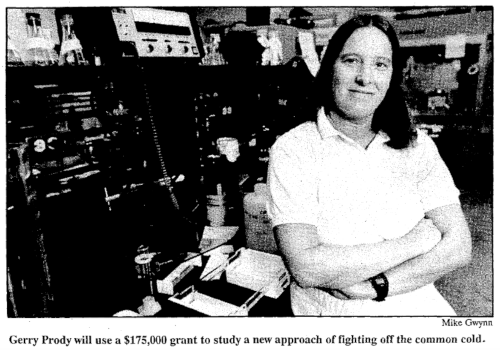
The picture at left is from the May 13, 1988 edition of the Western Front, which featured an article about Dr. Prody's NSF grant.
Dr. Prody came to WWU in 1984, and her first order of business was to completely modernize the biochemistry curriculum, both lecture and lab. Eventually, she added the third quarter of biochemistry to the lecture series, CHEM/BIOL 473 (Molecular Biology), and its companion lab course, CHEM/BIOL 475. These two courses were team taught for many years with her friend and colleague, Prof. Carol Trent from Biology. Dr. Prody was instrumental in ensuring that this rigorous curriculum kept pace with the rapid developments that occurred over the past decades (especially in the fields of protein biochemistry and molecular biology). Much of Dr. Prody’s curricular foundation is still evident in the current curriculum. Students who complete the Biochemistry degree are well-equipped to enter graduate or medical school or become, among many other options, research lab technicians.
In her 38 years at WWU, Dr. Prody mentored hundreds of undergraduate research students and six master's students - including longtime department stockroom manager and safety coordinator Gary Carlton. She was also a thesis committee member for several dozen students. One of Dr. Prody’s graduate students, Florian Evangeline (Vangie) Christensen, won the Western Association of Graduate Schools’ award for the best M.S. thesis in the country in 1991, which was received in Honolulu. Vangie presented her work at the International Congress of Virology in Berlin. Other students were pleased to present posters at the American Society for Virology in Vancouver, and the American Society for Plant Biology meetings in Portland, Seattle, and Honolulu, to name a few. Dr. Prody had a one-year sabbatical in 1992-93 with Andy Jackson at UC Berkeley, Department of Plant Biology. Her research of late centered around understanding the role of pectin remodeling following fertilization in petunia pistils, which resulted from her two-year research leave with John Labavitch at UC Davis in the Department of Pomology.
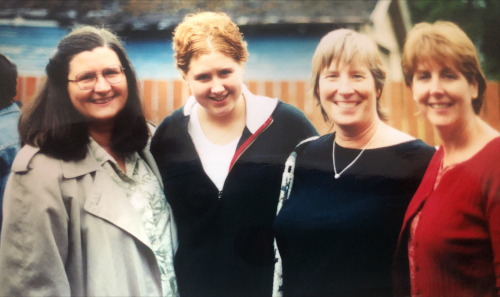
The picture at right (from June, 2000) shows Dr. Prody (second from right) with her friends Denice Hougen (left, former Chemistry Department manager), DeeDee Lombard (right, former Chemistry Department secretary), and Taylor Friar (DeeDee's daughter).
Throughout her career at Western, Dr. Prody has taught CHEM 161, 162, 375, 471, 472, 473, 474, 475, virology, and immunology. She also had a brief stint teaching University 101. Dr. Prody has been a new student advisor for decades, and will miss all the interactions with her students. And finally, she has consistently been a firm supporter of and cheerleader for junior faculty and staff members - especially in the Chemistry and Biology Departments.
2020-21 Student Awards
CRC Press Chemistry Achievement Award - Keavy Lynch
Outstanding Honors Chemistry Student - Julia Schwartz
Outstanding Organic Student - Gabriel Linares-Beach
Senior Organic Chemistry Student Award - Jessica Gallawa
Outstanding Analytical Student - Justin McGlone
Outstanding Inorganic Student - Hanalei Lewine
Outstanding Computational Student - Sage Pavey
Outstanding Physical Chemistry Student - Reilly Lynch
Advancing Chemistry Through Service (ACTS) Award - Alexandra Hoff, Hanalei Lewine, and Jason Stockwell
Sea Bong Chang Memorial Biochemistry Award - Izzi Piper
Outstanding Department Graduate - Melody Gao
Presidential Scholar Award - Melody Gao
Outstanding Graduate Teaching Assistant - Corey Teply
Outstanding Master's Graduates - Walker Marks and Maggie Wang
Outstanding Student Initiative Award - All the students who worked at Northwest Labs to assist with Covid testing during the shutdown!
2021-22 Student Fellowships and Scholarships
WWU Chemistry Scholarships - Justin McGlone and Willow Moss
Larry Heimark Chemistry Scholarship - David Cummins
Hach Land Grant Scholarships - Eden Ojala and Kaliya Moen
Verna Alexander Price Chemistry Scholarship - Brandon Parker
Jerry Price-Nancy Scherer Scholarship - Olivia Caldwell
Ruth Watts Female Scientist Scholarship - Elise Tahti
Barbara French Duzan Scholarships - Nathan Avery, Kayla Croney, Hayden Houck, and Julie Schexnayder
Knapman Chemistry Scholarships - Ali Keller and Hanna Kodama
Rathmann Family Foundation Scholarship - Josue Claros
Women in Science Scholarship - Hayden Houck
Robert L. Hamilton Family Graduate Scholarship - Nicholas Hall
Barbara Ellen Maguire-Veith Family Scholarship - David Cummins
Karen & Joseph Morse Fellowships - Jazmine Balila and Christian Phillips
Denice (Ambrose) Hougen Fellowship - Abby Andersen
Jarvis Memorial Summer Research Award - Sam Patrick
Elwha Summer Research Award - Hanna Kodama
Student Research Highlights
Throughout the year, the Research Recaps section of Western Today has showcased our students' accomplishments. (Follow @WWUResearch on Twitter to see more of these highlights.)
- Joseph Gish and other members of the Spiegel research group published the cover article in the May 2021 issue of Blood.
- Johanna Urbach, a graduate student in the Anthony-Cahill research group, received a WWU Graduate Research Award for her research on hemoglobin.
- Izzi Piper, Sarah Struyvenberg, and other members of the Antos and Amacher research groups published a collaborative paper in the Journal of Biological Chemistry. (Click here to read this highlight, which also includes a section about a collaborative NSF grant supporting the Bussell and Berger research groups.)
- Hannah Hennig, a graduate student in the Bussell research group, received both a WWU Graduate Research Award and a WWU Washington Space Grant Consortium Summer Research Award for her research on the development and characterization of photothermal catalysts. (Click here to read this highlight, which also includes a section about Prof. Amanda Murphy's Henry Dreyfus Teacher-Scholar Award.)
- Many WWU students did an outstanding job presenting their research at the American Chemistry Society national meeting in San Diego in March. Four received awards for their poster presentations: Kate McConnell and Hayden Houck (Larsen research group), Jill Addington (Berger research group), and Wynn Wee (Bao research group).
- Several Biochemistry majors have participated in summer research programs across the country. Melody Gao (Amacher research group) was in the Amgen Scholars Program at UCLA in the summer of 2021. Kevin Alexander Estrada Alamo (Amacher research group) and Jonah Goodfried (Galati research group in the Biology Department) will be in the Summer Undergraduate Research Program (SURP) at the Fred Hutchinson Cancer Research Center in Seattle in the summer of 2022. Hanna Kodama (Amacher research group) will be in the Summer Student Program at the Jackson Laboratory (Bar Harbor, Maine) in the summer of 2022.
WWU Chem Club
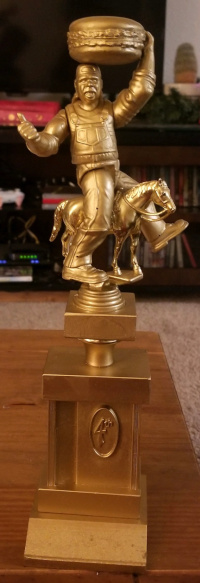
The 2021-22 academic year has been a time of renewal for the WWU Chem Club. During the early parts of the Covid pandemic, the club held online meetings and events (e.g., Cooking with a Prof, Pictionary, and Chat with a Prof). However, in the fall, the club was able to hold its first in-person meeting in over a year. The club performed weekly chemistry demos and focused on re-establishing an on-campus presence. This spring, the club has been able to host several in-person activities. In May, they hosted their first Chemistry Bake-Off and started a new tradition by awarding a custom trophy to the bake-off winner (picture shown at left). The club also helped set up for the Scholars Week Poster Session that returned to an in-person event (picture at right). The club is looking forward to once again hosting the Chemistry Picnic at Whatcom Falls Park.
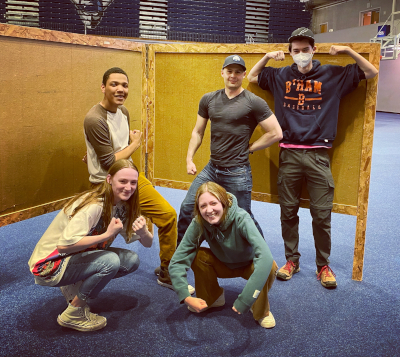
While the pandemic has been a challenging time for everyone, it can be an opportunity to reflect on the importance of the personal connections we make or have made during our time at WWU. The WWU Chem Club hopes to facilitate making those connections amongst the Department’s students, staff, and faculty. The club looks forward to renewing its activities in the coming year, especially performing demonstration shows at local schools.
If you participated in Chem Club activities over the past years, we ask you to please share your favorite stories and/or pictures via Facebook (www.facebook.com/wwuchem) or email (steven.emory@wwu.edu, Subject: Chem Club memories). We plan to compile and share these in future newsletters and the department webpage.
ACS NORM

After the planned 2020 meeting was postponed due to Covid, our department hosted (remotely) a lively and successful American Chemical Society (ACS) Northwest Regional Meeting (NORM) on May 9-11, 2021. The meeting was a long time in the making, and many people worked hard to make it happen. In particular, co-chairs of the 2020 meeting were Profs. John Gilbertson and Greg O'Neil, co-chairs of the 2021 meeting were Profs. Steven Emory and Jim Vyvyan, and other planning committee members and session chairs included Profs. Jeanine Amacher, Ying Bao, Rob Berger, Mark Bussell, Tim Kowalczyk, Mike Larsen, Jay McCarty, Amanda Murphy, David Rider, Margaret Scheuermann, Clint Spiegel, and Tommaso Vannelli (previously at WWU, currently at Whatcom Community College). We are also grateful to the major donors who supported ACS NORM: Phillips 66 - Ferndale Refinery, Bend Research, Alcoa Intalco Works, BP - Cherry Point Refinery, the Research Corporation for Science Advancement, Xenon Pharmaceutical, Shimadzu, and the American Chemistry Society - Undergraduate Programs.
Interdisciplinary Science Building

The beautiful new Interdisciplinary Science Building (ISB) officially opened in the spring of 2022! The ISB will house active learning classrooms and teaching labs for Chemistry and a variety of other STEM departments, which will allow us to better support the growing numbers of students in STEM fields. Some chemistry courses are already taking place in the ISB, and the general chemistry teaching labs will move there starting in the fall of 2022. We are especially grateful for the role that Prof. Amy Cully has played throughout the planning stages of the building, and in coordinating the move of our general chemistry teaching labs. Learn more about the ISB.
Faculty Promotions and New Roles
In the fall of 2021, Prof. Margaret Scheuermann was promoted to Associate Professor and Prof. Amanda Murphy was promoted to Full Professor. Dr. Murphy also took over as Director of AMSEC (the Advanced Materials Science & Engineering Center) in 2021.
Prof. Steven Emory was named Director of WWU's Scientific Technical Services in 2021.
Prof. G McGrew was appointed Interim Co-director (alongside Andrew Lucchesi, English) for the new WWU Institute for Critical Disability Studies through the summer of 2022. Planning for the institute and academic program began in 2019, and will continue to grow and add cross-listed coursework (with the course prefix DISA) from departments across Western.
Prof. Jeanine Amacher is, starting in January 2022, an Associate Editor of the journal Protein Science, and also on the Editorial Board of the journal ASBMB Today.
Faculty Awards and Honors
Prof. Amanda Murphy received a 2021 Henry Dreyfus Teacher-Scholar Award (and $75,000 grant) from the Dreyfus Foundation, which is given to eight chemists nationwide each year for their outstanding work at primarily undergraduate institutions.
Prof. Mike Larsen received a 2022 Cottrell Scholar Award (and $100,000 grant) from the Research Corporation for Science Advancement for his proposal titled "Diverse N-functionalized polyureas by cationic ring-opening polymerization of iminooxazolidines". This award is given to 24 early-career chemists and physicists nationwide each year.
Prof. John Gilbertson was honored with the 2022 Arlan Norman Award for Excellence in Student Mentoring. This award recognizes a faculty member in the WWU College of Science & Engineering for excellence shown in the mentorship of graduate and undergraduate student researchers.
Prof. Greg O'Neil received an Alexander von Humboldt Further Research Stay in Germany Alumni Award, supporting his spring 2022 sabbatical at the Organisch-Chemisches Institut, University of Münster.
Grant Funding
Prof. Ying Bao received a grant from the National Science Foundation for her project titled "Development of novel plasmonic nanotransducers for solution-based molecular imprinted sensing" ($366,533 over 3 years). With this funding, the Bao group will study a new class of nanoparticle-based sensors which detect tiny amounts of biological molecules in solution.
Prof. Mark Bussell, with co-PI Prof. Rob Berger, received a grant from the National Science Foundation for their project titled "Metal phosphides on nanostructured indium oxide - New photocatalysts for CO2 hydrogenation" ($366,514 over 3 years). The groups aim to develop a new class of catalysts for the conversion of the greenhouse gas carbon dioxide to solar fuels such as methanol, which can be stored for use when sunlight is not available.
Prof. Greg O'Neil received an Academic Research Enhancement Award (AREA) from the National Institutes of Health for his project titled "Regio-, stereo-, and chemoselective cooperative-based mediated hydrosilylations for improved drug synthesis" ($300,000 over 3 years). This grant is focused on leveraging a mild hydrosilylation protocol discovered in the O'Neil group to synthesize compounds of medicinal value.
Prof. Emily Borda, who is also Director of the Science Math and Technology Education (SMATE) program, is one of three project leaders (along with Dr. Dan Hanley and Shannon Warren) of the BETTER in STEM program. This is a 5-year, $3 million collaborative research project funded by the National Science Foundation, aiming to embed the use of inclusive instructional strategies within undergraduate STEM courses and departments.
Profs. Jeanine Amacher and John Gilbertson each received Cottrell Postbac Awards of $50,000 from the Research Corporation for Science Advancement. These awards provide graduating seniors the opportunity to continue their research projects for a year after graduation. With these awards, Jadon Blount will continue working in the Amacher lab, while Allison Teigen will continue working in the Gilbertson lab.
Prof. Michael Enright received an NNCI Northwest Nanotechnology Infrastructure seed grant for $9,800 for his project titled "Anisotropic nanomaterial heterostructures for photocatalysis", a spectroscopic effort to understand structural and morphological attributes of nanoscale catalysts for photocatalysis and solar fuels generation.
Publications
In the past academic year, Chemistry faculty have published 26 peer-reviewed articles detailing their research, which include 34 undergraduate (*) and 23 graduate (†) WWU student co-authors.
*Piper, IM; †Struyvenberg, SA; *Valgardson, JD; *Johnson, DA; *Gao, M; *Johnston, K; *Svendsen, JE; *Kodama, HM; Hvorecny, KL; Antos, JM; Amacher, JF. "Sequence variation in the β7–β8 loop of bacterial class A sortase enzymes alters substrate selectivity". J. Biol. Chem. 2021, 297, 100981.
†Wofford, HA; *Myers-Dean, J; *Vogel, BA; *Alamo, KAE; *Longshore-Neate, FA; Jagodzinski, F; Amacher, JF. "Domain Analysis and Motif Matcher (DAMM): A program to predict selectivity determinants in Monosiga brevicollis PDZ domains using human PDZ data". Molecules 2021, 26, 6034.
*Gao, M; *Johnson, DA; *Piper, IM; *Kodama, HM; *Svendsen, JE; *Tahti, E; *Longshore-Neate, F; †Vogel, B; Antos, JM; Amacher JF. "Structural and biochemical analyses of selectivity determinants in chimeric Streptococcus Class A sortase enzymes". Protein Sci. 2021, 31, 701-715.
*Boyko, KV; †Rosenkranz, EA; *Smith, DM; †Miears, HL; †Oueld Es Cheikh, M; *Lund, MZ; Young, JC; Reardon, PN; Okon, M; Smirnov, SL; Antos, JM. "Sortase-mediated segmental labeling: A method for segmental assignment of intrinsically disordered regions in proteins". PLoS One 2021, 16, e0258531.
†Crockett, JR; Win-Piazza, H; †Doebler, JE; †Luan, T; Bao, Y. "Plasmonic detection of mercury via amalgamation on gold nanorods coated with PEG-thiol". ACS Appl. Nano Mater. 2021, 4, 1654-1663.
Song, Y; Liu, W; Mu, X; Zhong, X; Cui, A; Sun, Y; †Crockett, JR; Bao, Y; Shan, G; Chen, Y. "Photothermal-enhanced peroxidase-like activity of CDs/PBNPs for the detection of Fe3+ and cholesterol in serum samples". Microchimica Acta 2022, 189, 30.
†Teply, C; †Tyler, BA; Berger, RF. "Tuning the band gaps of oxide and halide perovskite compounds via biaxial strain in all directions". J. Phys. Chem. C 2021, 125, 25951-25958.
Haskell, T; Borda, EJ; Boudreaux, A. "Cross-disciplinary learning index: A quantitative measure of cross-disciplinary learning about energy". Phys. Rev. Phys. Educ. Res. 2022, 18, 010108.
†Topalian, PJ; †Carrillo, BA; †Cochran, PM; *Takemura, MF; Bussell, ME. "Synthesis and hydrodesulfurization properties of silica-supported nickel-ruthenium phosphide catalysts". J. Catal. 2021, 403, 173-180.
De Bruyn, WJ; Clark, CD; Harrison, AW; Senstad, M; Hok, S. "The degradation of acetaldehyde in estuary waters in Southern California, USA". Environ. Sci. Pollut. Res. 2021, 28, 35811-35821.
†Marks, WR; Reinheimer, EW; Seda, T; Zakharov, LN; Gilbertson, JD. "NO coupling by nonclassical dinuclear dinitrosyliron complexes to form N2O dictated by hemilability". Inorg. Chem. 2021, 60, 15901-15909.
†Szabo, R; *Le, KN; Kowalczyk, T. "Multifactor theoretical modeling of solar thermal fuels built on azobenzene and norbornadiene scaffolds". Sustain. Energy Fuels 2021, 5, 2335-2346.
Kawashima, H; Ukai, S; Nozawa, R; Fukui, N; *Fitzsimmons, G; Kowalczyk, T; Fliegl, H; Shinokubo, H. "Determinant factors of three-dimensional aromaticity in antiaromatic cyclophanes" J. Am. Chem. Soc. 2021, 143, 10676-10685.
Epifanovsky, E et al., including Kowalczyk, T. "Software for the frontiers of quantum chemistry: An overview of developments in the Q-Chem 5 package". J. Chem. Phys. 2021, 155, 084801.
Jin, E; Geng, K; Fu, S; Yang, S; †Kanlayakan, N; Addicoat, MA; Kungwan, N; Geurs, J; Xu, H; Bonn, M; Wang, HI; Smet, J; Kowalczyk, T; Jiang, D. "Exceptional electron conduction in two-dimensional covalent organic frameworks". Chem 2021, 7, 3309-3324.
Shen, H; Larsen, MB; Roessler, AG; Zimmerman, PM; Boydston, AJ. "Mechanochemical release of N-heterocyclic carbenes from flex-activated mechanophores". Angew. Chem. Int. Ed. 2021, 60, 13559-13563.
Nguyen, PH et al., including McCarty, J. "Amyloid oligomers: A joint experimental/computational perspective on Alzheimer’s disease, Parkinson’s disease, type II diabetes, and amyotrophic lateral sclerosis". Chem. Rev. 2021, 121, 2545-2647.
Dounas-Frazer, DR; Gillen, D; Herne, CM; *Howard, E; Lindell, RS; McGrew, GI; Mumford, JR; Nguyen, NH; †Osadchuk, LC; Principato Crane, J; Pugeda, TM; *Reeves, K; Scanlon, EM; Spiecker, D; Xu, SZ. "Increase investment in accessible physics labs: A call to action for the physics education community". American Association of Physics Teachers, Committee on Laboratories Accessible Physics Labs Task Force Report, 2021. Full text on arXiv
O'Neil, GW. "Siletanes: Synthesis, structure, and reagents in organic synthesis. A review". Org. Prep. Proced. Int. 2022, 54, 95-127. Full text
*Myers, CR; *Spaltenstein, P; *Baker, LK; *Schwans, CL; Clark, TB; O'Neil, GW. "Sequential iodine-mediated diallylsilane rearrangement/asymmetric dihydroxylation: Synthesis and reactions of enantioenriched oxasilacycles". Tetrahedron Lett. 2021, 82, 153392.
Gosselin, KM; Nelson, RK; Spivak, AC; Sylva, SP; Van Mooy, BAS; Aeppli, C; Sharpless, CM; O'Neil, GW; Arrington, EC; Reddy, CM; Valentine, DL. "Production of two highly abundant 2‑methyl-branched fatty acids by blooms of the globally significant marine cyanobacteria Trichodesmium erythraeum". ACS Omega 2021, 6, 22803-22810.
O'Neil, GW; *Gale, AC; Nelson, RK; *Dhaliwal, HK; Reddy, CM. "Unusual shorter-chain C35 and C36 alkenones from commercially grown Isochrysis sp. microalgae". J. Am. Oil Chem. Soc. 2021, 98, 757-768.
*Koch, KC; †Korus, D; †Doyle, J; *Plummer, M; *Boxx, M; Win-Piazza, H; McDowall, S; Patrick, DL; Rider, DA. "Quantum dot-block copolymer hybrids for low scattering luminescent solar concentrators" ACS Appl. Polym. Mater. 2022, in press.
*Nadeem, A; †Brown, EA; Radford, MJ; Andreu, I; Gates, BD; Rider, DA. "Improved resilience and uniformity in polysulfone blends from an accelerated grafting ring-opening polymerization reaction with benzoxazine". Macromolecules 2021, 54, 10017-10030.
†Rauschendorfer, RJ; †Whitham, KM; *Summer, S; *Patrick, SA; *Pierce, AE; †Sefi-Cyr, H; Tadjiki, S; Kraft, MD; Emory, SR; Rider, DA; Montaño, MD. "Development and application of nanoparticle-nanopolymer composite spheres for the study of environmental processes". Front. Toxicol. 2021, 3, 752296.
Childers, KC (WWU postdoc); *Peters, SC; Lollar, P; Spencer, HT; Doering, CB; Spiegel, PC. "SAXS analysis of the intrinsic tenase complex bound to a lipid nanodisc highlights intermolecular contacts between factors VIIIa/IXa". Blood Adv. 2022, in press.
*Ronayne, EK; *Peters, SC; †Gish, JS; *Wilson, C; Spencer, HT; Doering, CB; Lollar, P; Spiegel, PC; Childers, KC (WWU postdoc). "Structure of blood coagulation factor VIII in complex with an anti-C2 domain non-classical, pathogenic antibody inhibitor". Front. Immunol. 2021, 12, 697602.
